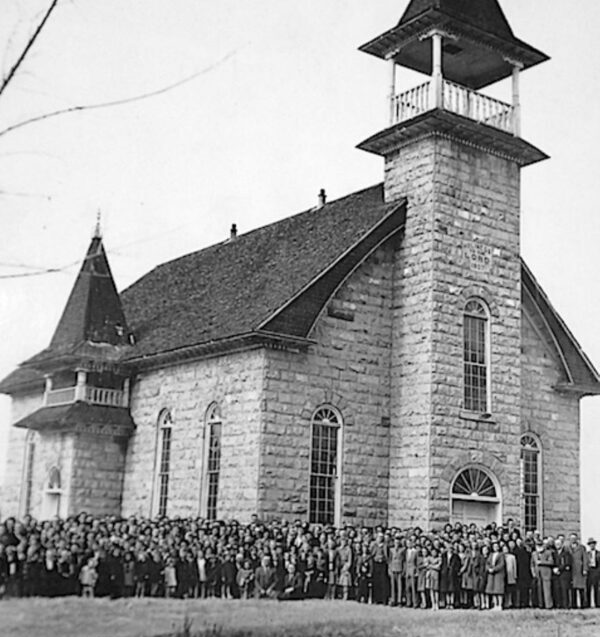Nearly every summer, I find myself spending time in the beautiful mountains of Southern Colorado. I spend my time with my family, as we climb up great sand dunes, listen to thunder echoing against rocky mountain walls, pick rain-soaked wildflowers, sing along to John Denver, ride ATVs through the grassy meadows, hold horseshoe tournaments, and wake up early to watch the mist roll in over the towering cliffs surrounding my great-grandma’s cabin.
I love all of these things, but there is one aspect of our annual visit to the cabin that I love the very most. I love it when we all cram into the living room, to listen to my great-grandmother tell stories of our ancestors. I love when we take walks by my great-great-grandparents’ old cabin.
When I walk by, it’s almost like I can feel them and all of my other ancestors with me, even though they returned to their heavenly homes long ago. I love watching old recordings of my great-great-grandpa, and I love visiting the cemeteries where those who came before me are laid to rest. To put it simply, I think my favorite part of going to the cabin with my family is the opportunity I have to become better connected with my heritage.
Heritage has always been a word that was hard for me to define. To some, heritage may be found in old buildings. To others, heritage may be about how our ancestors lived or how they worked. And to others, heritage may be a mere scientific study of older cultures. But in my mind, heritage is embodied in the principles our forefathers teach us.
With Pioneer Day approaching, it is worth revisiting the principles that guided the pioneers in their lives and how they can be beneficial in our lives today. Through living these principles, we can become better connected with our heritage and learn the many valuable lessons they teach. Some of these lasting principles include resilience, courage, sacrifice, freedom, and faith.
The pioneers have taught us a great lesson in resilience. Time and time again, our pioneer ancestors showed incredible strength as they pressed forward, even despite the tremendous difficulties and trials they faced. They pushed onward, even through the darkest of times. As they nursed their sick, fought the bitter cold and relentless weather, walked miles upon miles, and even buried those they loved, they never gave up. And because they did not give up, we are here. Because they did not give up, we know that overcoming our own immense adversities is possible.
The pioneers showed great courage. In the words of a video from a show at Historic Nauvoo, “… the Saints did not know where they would end up. West is just a direction, not a destination.” They had courage to leave their homes, even though they did not know where they were going or how long the journey would be. They had the courage to risk everything and to continue on in faith, even in the face of fear.
Another thing the pioneers did was sacrifice. Many of them sacrificed nearly every earthly possession they had for their faith. They sacrificed their familiar homes in order to walk over a thousand miles to a home that they had never seen. Many even sacrificed their lives along the long, tear-soaked trail. What I believe enabled them to make these immense and selfless sacrifices was their ability to see what mattered most.
A desire for freedom was one of the foundational principles that would fuel the perseverance of the pioneers as they made their way west. Like the Pilgrims that came before them, they believed that their freedom to believe and worship according to their conscience was essential, and they wanted to preserve those rights. For them, that meant leaving behind comfort for what would become a lifetime of hardship.
Above all these principles, the pioneers were motivated by their trust and unending faith in God. Freedom of religion was one of the most important things that they could gain by traveling westward. I’ve heard many stories of people traveling long distances to find gold or to homestead land, but none of them strike me as great as the story of these pioneers, who traveled because of their belief in God.
Today, the unmarked graves along those old pioneer trails bear witness of the faith of those who were willing to give everything. The countless memorials and monuments to the pioneers are reminders of what we can accomplish when we trust in God, and when our faith endures every challenge. The strength of the pioneers teaches us that when we are true to our faith, we can and will prosper, even in troubled times.
This is what my heritage means to me.
In the end, I believe heritage is not just about understanding where we came from, or who our ancestors are. Heritage is also about understanding who we are, because of who our forefathers were. It is about understanding what we can do, because of what they did.
Now, we are the legacies of our ancestors. In fact, we may be one of the most important things they have left behind. We have a part to play, and an obligation, in the preservation of our heritage.
With this heritage, we can work to make this world a better place, and to allow the story and spirit of our ancestors to live through us. Only as we connect with our heritage and learn from those who came before us, are we able to truly understand who we are. And only then can we find greater meaning for our lives.
– by Nadia Griffin (18) Escalante
Feature image caption: Early converts to the Church of Jesus Christ of Latter-day Saints from the southern states settled San Luis Valley in south-central Colorado beginning in 1878. Here in an undated photo, the LDS Sunday School poses for a group photo in front of the stone chapel built in Sanford. In a symbol of their faith, the plaque over the door reads, “Holiness to the Lord, 1907.” Courtesy of Colorado History Museum/University of Colorado – Denver.

Nadia Griffin – Escalante
Nadia is a former designer and junior editor for The Byway. She graduated from Escalante High School in 2023. She is also the oldest of nine children. Nadia enjoys writing in almost every genre. In her free time, she loves to play and compose music.
Nadia is currently serving a mission for the Church of Jesus Christ of Latter-day Saints in the New Jersey Morristown Mission.

